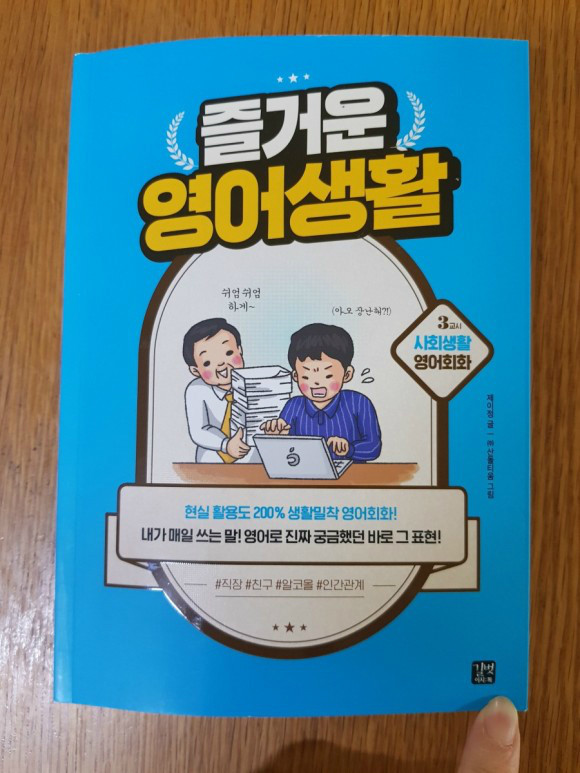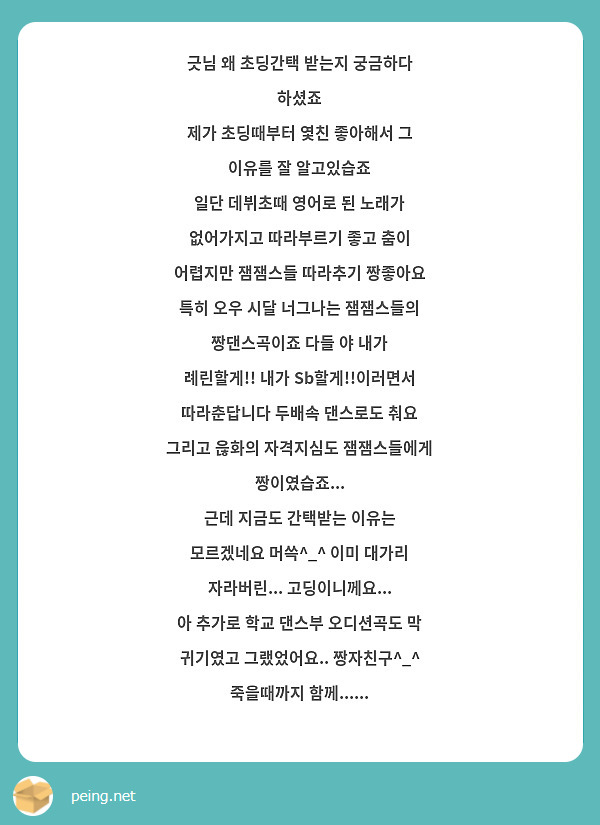궁금하다 영어로
궁금하다는 한국어로 특정 정보나 사실에 대해 이해를 하지 않은 상태에서 불안하고 궁금증을 느끼는 상태를 의미합니다. 영어로는 curious wonder나 curiosity라는 표현으로 표현이 가능합니다.
하지만 궁금하다 뜻 이외에 다른 표현도 있습니다. 예를 들어 wonder, ponder, question, inquire, and be curious 또한 궁금한 상태를 표현하는 단어들입니다.
궁금한 상태가 되면 그 정보에 대한 이해를 위해 알아보기 시작하는데, 이는 영어 실력 향상에도 도움이 됩니다. 그러나 영어로 궁금한 것을 묻거나 대화를 나누기 위해서는 올바른 문법과 표현력이 필요합니다.
따라서 궁금하다 영어로 표현하는 것은 영어 실력을 향상시키는 데 매우 중요합니다. 여기에서는 영어로 궁금한 것을 묻고 대화를 향상시키는 방법을 알아보겠습니다.
영어로 묻고 답하기: 대화에서 궁금증 해결하는 능력 향상
대화에서 궁금한 사항을 해결하는 능력은 영어 실력 향상에 핵심적인 역할을 합니다. 대화에서 궁금하다는 것은 상대방에게 다른 관심사를 표현해서 대화를 활발하게 만드는 것입니다.
실제로 영어권에서의 대화 중에 궁금증이 생긴다면, 그것을 바로 질문하는 것이 바람직합니다. 그러나 질문을 할 때는 올바른 문법과 표현력이 필요합니다.
영어로 궁금한 것을 묻거나 대화를 나누기 위해서는 올바른 문법과 표현력이 중요합니다. 예를 들어, ‘Do you know where the nearest post office is?’와 ‘Where is the nearest post office?’는 상대방과 대화하는 상황에 따라 다르게 사용됩니다.
전자의 경우, 대화 상대가 그 지역의 모든 우체국 위치를 알지 않더라도 어딘가에 정보를 알고 있을 것으로 예상됩니다. 반면에 후자는 상대방이알지 못할 수도 있는 정보를적극적으로 요청하는 것입니다.
따라서 영어 대화에서 궁금한 점을 묻고 대화를 활발하게 하는 방법을 익히는 것이 필요합니다.
영어로 질문하기: 올바른 문법과 표현으로 질문 구성하기
영어로 궁금한 것을 질문하려면, 올바른 문법과 표현력이 필요합니다. 만약 보통 일상 생활에서 궁금한 것을 영어로 질문하려면, 질문문 앞에 동사를 추가하면 됩니다.
예를 들어, ‘What do you do?’는 일상적인 대화에서 많이 사용하는 질문입니다. 이것은 ‘당신께서 어떤 일을 하시나요?’라는 의미를 담고 있습니다. 따라서 이와 같은 방식으로 올바른 문법과 표현으로 질문을 구성하는 것이 중요합니다.
영어로 답하기: 적절한 답변을 제공하는 방법 연습하기
대부분의 경우, 대화에서 자주 묻는 질문은이미 표준화되어 있습니다. 따라서 영어로 궁금한 것을 묻고 답할 때, 적절한 답변을 제공하는 것이 중요합니다.
적절한 답변을 제공하기 위해서는 먼저 질문에 대한 답을 찾기 위한 번역 공부가 필요합니다. 그리고 다른 질문을 통해 상세한 정보를 얻는 것이 좋습니다.
실제로 영어권에서는, 물음표 영어로 질문을 제대로 어떻게 이해했는지 묻는 것이 일반적입니다. 예를 들어, ‘Did you understand my question?’구글 번역기를 사용하여 해석된 내용을 묻는 경우가 많습니다. 이는 서로 간에 대화가 잘 되고 정보를 바로 알려주는 능력을 향상시키는 데 도움이 됩니다.
영어 습득을 위한 독해: 궁금한 내용을 이해하고 활용하는 방법 익히기
궁금한 것을 묻기 전에, 영어로 적합한 단어와 표현을 확실히 습득하는 것이 중요합니다. 그래서 영어 작가의 도움을 받는 것이 좋습니다. 도움을 받기 위해서는, 쉽게 볼 수 있는 읽기 자료가 필요합니다.
영어 독해 연습을 위해서는 읽기 자료를 선택하는 것이 중요합니다. 예를 들어, 일기를 작성해보는 것이 영어 습득의 좋은 방법입니다. 그 예로, 선배가 작성한 “가입하는 이유”와 같은 일기를 참고할 수 있습니다.
언어 교환 프로그램 참여하기: 영어 실력 향상을 위한 효과적인 방법 중 하나
언어교환 프로그램은 영어 실력 향상을 위한 효과적인 방법 중 하나입니다. 이 프로그램의 목적은 다양한 나라와 문화를 접하면서 영어 회화 능력을 동시에 향상시키는 겁니다. 이러한 프로그램 참여는 호기심과 추진력을 증가시켜주는 상호 교감을 촉진하여 영어 실력 향상에 도움이 됩니다.
영어를 잘 하기 위해서는 실제로 영어권인 사람들과 대화해 보는 것이 가장 효과적입니다. 따라서 대화의 기회를 파악하고 직접 영어권의 사람들과 어울려보는 것이 바람직합니다.
문제해결을 위한 학습자 중심 학습: 궁금증을 스스로 해결하는 능력 키우기
영어로 궁금한 것을 묻고 대화를 나누는 것은 영어실력 향상을 위한 중요한 역할을 합니다. 그러나 영어권에서 대화를 나눌 때 자신의 궁금증을 스스로 해결할 수 있는 능력을 키우는 것도 중요합니다.
학습자중심학습에 의하여 자신의 이해도를 높이고 스스로 해결방법을 찾아내는 습관을 길려야 합니다. 이는 영어생활 전반에 적용될 수 있는 유용한 능력입니다.
FAQs
Q. 궁금하다 영어로 표현할 때 자주 쓰이는 표현은 무엇인가요?
A. 궁금하다는 영어로 curious wonder나 curiosity라는 표현으로 자주 사용됩니다.
Q. 궁금하다 영어로 표현할 때, 다른 표현은 어떤 것이 있나요?
A. 다른 표현으로는 wonder, ponder, question, inquire, and be curious 등이 있습니다.
Q. 언어교환 프로그램은 영어 실력 향상에 어떤 효과가 있나요?
A. 언어교환 프로그램은 다양한 나라와 문화를 접하면서 영어 회화 능력을 동시에 향상시키는 데 효과적입니다.
Q. 영어로 궁금한 것을 묻고 답변을 배우는 데 가장 좋은 방법은 무엇인가요?
A. 영어로 궁금한 것을 묻고 대화를 나누면서 상대방의 답변을 참고하는 것이 가장 효과적인 방법입니다.
사용자가 검색한 키워드: 궁금하다 영어로 Curious wonder 차이, 궁금하다 다른 표현, 호기심 영어로, 궁금하다 뜻, 궁금하니 영어로, 물음표 영어로, 궁금하다 일본어, 궁금해서 영어로
Categories: Top 13 궁금하다 영어로
[ 영어 대화가이드 ] \”궁금하다\”, \”궁금한게 있다\”
여기에서 자세히 보기: chinhphucnang.com
Curious wonder 차이
Curious wonder 차이 manifests itself in many ways, from asking questions and seeking answers to trying new things and exploring different perspectives. It is a crucial quality that drives innovation, creativity, and progress. In this article, we will explore what Curious wonder 차이 means in Korean culture and how it influences individuals and society.
The Meaning of Curious wonder 차이 in Korean Culture
Curious wonder 차이 is deeply ingrained in Korean culture. The value placed on education and lifelong learning is a testament to the importance of Curious wonder 차이. Korean parents prioritize their children’s education from an early age, encouraging them to explore different subjects and pursue their interests. In Korean schools, students are taught to question and seek answers, and the education system promotes critical thinking and creativity.
Curiosity is also evident in Korean entertainment, particularly in pop culture. K-dramas and K-pop are popular worldwide, and they often feature curious and adventurous characters who explore new places, try new things, and overcome challenges. These shows and songs inspire viewers and listeners to embrace Curious wonder 차이 and pursue their passions.
Curious wonder 차이 is also reflected in Korean cuisine. Korean food is known for its variety, bold flavors, and complex aromas. Korean chefs are constantly experimenting with new ingredients and techniques to create unique and delicious dishes. Korean cuisine offers endless possibilities for exploration and discovery, and it is a source of pride for Koreans.
How Curious wonder 차이 Influences Individuals
Curious wonder 차이 plays a significant role in shaping individuals’ lives. It ignites a thirst for knowledge, encourages self-discovery, and inspires creativity. When individuals embrace Curious wonder 차이, they open themselves up to new experiences and opportunities for growth.
In the workplace, individuals who are curious are more likely to excel. They are eager to learn new skills, adapt to new situations, and find innovative solutions to problems. Curious individuals bring fresh perspectives to their work, which can lead to breakthroughs and advancements.
Curious wonder 차이 also fosters personal growth. It encourages individuals to explore their passions and pursue their dreams. Whether it’s learning a new language, traveling to a foreign country, or starting a business, Curious wonder 차이 gives individuals the courage and motivation to take risks and try new things.
How Curious wonder 차이 Influences Society
Curiosity is not just an individual trait; it also plays a crucial role in shaping society. Curiosity fuels innovation, drives scientific advancements, and inspires social change. When society embraces Curious wonder 차이, it thrives.
In Korea, Curious wonder 차이 has led to many of the country’s greatest achievements. Korean scientists and engineers are renowned for their inventions and breakthroughs in technology. From the development of 5G networks to the creation of K-pop, Curious wonder 차이 has been the driving force behind many of Korea’s successes.
Curiosity also plays a crucial role in social change. When individuals are curious, they question the status quo and seek solutions to societal problems. Curious individuals are more likely to challenge discrimination, push for equality, and advocate for justice. Curious wonder 차이 has played a significant role in Korea’s democratization and its emergence as a global leader in human rights.
FAQs
Q: How can I cultivate Curious wonder 차이?
A: There are many ways to cultivate Curious wonder 차이, including:
1. Asking questions and seeking answers.
2. Trying new things and exploring different perspectives.
3. Reading, watching documentaries, and attending lectures.
4. Engaging in hobbies and activities that challenge you.
5. Traveling and experiencing different cultures.
Q: What are the benefits of being curious?
A: The benefits of being curious include:
1. Increased knowledge and understanding of the world.
2. Greater adaptability and flexibility in the face of change.
3. Improved creativity and innovation.
4. Better problem-solving skills.
5. Enhanced personal growth and self-discovery.
Q: How can Curious wonder 차이 contribute to society?
A: Curious wonder 차이 can contribute to society in many ways, including:
1. Driving scientific advancements and innovation.
2. Inspiring social change and progress.
3. Promoting human rights and democracy.
4. Encouraging critical thinking and creativity.
5. Fostering a lifelong commitment to learning and education.
Conclusion
Curious wonder 차이 is a crucial aspect of Korean culture and a valuable trait for individuals and society. It encourages exploration, knowledge-seeking, and personal growth. When individuals embrace Curious wonder 차이, they open themselves up to new experiences and possibilities for advancement. When society values Curious wonder 차이, it thrives. Through Curious wonder 차이, individuals and society can achieve breakthroughs and advancements, and make meaningful contributions to the world.
궁금하다 다른 표현
Expressions for Curiosity in Korean
1. 궁금하다 (Gung-geum-ha-da)
The most common expression for curiosity in Korean is “궁금하다”. This expression can be used to indicate mild curiosity or strong interest in a topic or situation. It can also be used to describe someone who is curious about everything and anything. For example, if you want to ask a friend if they are curious about something, you can say “궁금해?” (Gung-geum-hae?) which means “Are you curious?”
2. 호기심 (Ho-gi-sim)
Another expression that can be used to express curiosity is “호기심”. This expression is more formal than “궁금하다” and is used in situations where the speaker wants to convey a sense of intellectual curiosity. For example, if you are attending a conference and want to ask a question, you can begin your question by saying “저는 호기심으로 묻고 싶습니다” (Jeonun ho-gi-sim-euro mudgo sip-seum-ni-da) which means “I am curious and would like to ask.”
3. 찝찝하다 (Jjip-jjip-ha-da)
“찝찝하다” is an expression that is used to describe a feeling of discomfort or unease caused by curiosity. For example, if you are curious about a friend’s romantic relationship but feel uncomfortable asking them directly, you can express your curiosity by saying “찝찝해” (Jjip-jjip-hae) which means “I feel uneasy about something.”
4. 알고 싶다 (Al-go sip-da)
If you want to express a strong desire to know something, then “알고 싶다” is the perfect expression for you. This expression can be used to describe a strong desire to learn or to find out more information about a topic. For example, if you are interested in learning more about a new type of cuisine, you can say “저는 이 음식에 대해 더 알고 싶어요” (Jeonun i-eum-shik-e dae-hae deo al-go sip-eo-yo) which means “I want to know more about this cuisine.”
5. 궁금증 (Gung-geum-jeung)
“궁금증” is a noun that is used to describe a state of curiosity. This expression is similar to “알고 싶다” but is more focused on the state of wanting to know rather than the desire to learn something specific. For example, if you are feeling curious about a topic but are not sure what you want to know, you can say “저는 궁금증이 생겨서 뭔가 알고 싶다” (Jeonun gung-geum-jeung-i saeng-gyeo-seo mwon-ga al-go sip-da) which means “I have a curious feeling and want to know something.”
6. 기대하다 (Gi-dae-ha-da)
“기대하다” is an expression that can be used to describe a feeling of anticipation or expectation, usually because of curiosity. For example, if you are excited about a new movie that is coming out, you can say “이 영화를 기대하고 있어요” (I yeong-hwa-reul gi-dae-ha-go iss-eo-yo) which means “I am looking forward to this movie.”
FAQs
Q. When should I use “호기심” instead of “궁금하다”?
A. “호기심” is a more formal and intellectual expression than “궁금하다”. Use “호기심” in situations where you want to convey a sense of interest and curiosity in a more serious or professional setting.
Q. Can I use “궁금하다” and “알고 싶다” interchangeably?
A. No, while both expressions convey curiosity, “궁금하다” is often used to describe a general feeling of curiosity while “알고 싶다” is used to express a strong desire to know something specific.
Q. Is “찝찝하다” always connected to curiosity?
A. No, “찝찝하다” can be used to describe any feeling of discomfort or unease, including those that are not related to curiosity.
In conclusion, curiosity is an important aspect of language learning and mastering the expressions for expressing curiosity in Korean can greatly enhance your language skills. Whether you are interested in learning about a new topic or want to express your intellectual curiosity, there is an expression available in Korean for every situation. By incorporating these expressions into your vocabulary, you can better communicate with native Korean speakers and fully immerse yourself in the language and culture.
호기심 영어로
In this article, we’ll explore the concept of 호기심 영어로 and how it can be applied to various aspects of life. We’ll also address some common questions and concerns related to curiosity and how to develop it in yourself.
What is 호기심 영어로?
호기심 영어로 is the Korean term for curiosity in English. It refers to the natural desire to learn and explore new things, often driven by a sense of wonder or awe. Curiosity can manifest in many ways, from asking questions and seeking answers to trying out new activities and experiences.
Why is 호기심 영어로 important?
Curiosity is an essential component of personal growth and development. When you cultivate curiosity, you are more open to new ideas and perspectives, and you may be more willing to take risks and try new things. Curiosity can also lead to greater innovation and creativity, as well as a deeper understanding of the world around you.
How can 호기심 영어로 be applied in daily life?
There are many ways to cultivate curiosity in your daily life. Here are some ideas to get you started:
1. Explore new interests. Try out new hobbies or activities that interest you, even if they seem outside of your comfort zone. You might discover hidden talents or passions that you never knew you had.
2. Engage with new people. Talk to people from different backgrounds and cultures to learn about their experiences and perspectives. You may be surprised by the new insights and ideas you gain from these conversations.
3. Ask questions. Don’t be afraid to ask questions, even if they seem basic or silly. Asking questions can help you gain a deeper understanding of a topic and spark new ideas and insights.
4. Read widely. Read books and articles on a variety of topics, even if they don’t seem directly relevant to your interests. You never know what new connections and insights you might discover.
5. Embrace uncertainty. Curiosity often involves embracing uncertainty and exploring the unknown. Don’t be afraid to take risks and try new things, even if you don’t know the outcome.
What are some common barriers to 호기심 영어로?
Despite the many benefits of curiosity, there are still some common barriers that can prevent people from cultivating it. Here are a few:
1. Fear of failure. Many people are afraid to try new things because they fear failure or embarrassment. However, failure is often part of the learning process, and embracing it can help you grow and improve.
2. Narrow thinking. Some people may be so focused on their current interests and perspectives that they fail to see the value in exploring new topics or ideas. However, curiosity can help broaden your horizons and bring new insights to familiar topics.
3. Discomfort with uncertainty. Curiosity often involves exploring the unknown and embracing uncertainty. Some people may find this uncomfortable or anxiety-provoking, but learning to cope with uncertainty can help you build resilience and adaptability.
How can you overcome these barriers and cultivate 호기심 영어로 in yourself?
If you’re feeling stuck or hesitant about cultivating curiosity, there are several strategies you can try:
1. Start small. You don’t have to dive into a completely new topic or activity all at once. Start by exploring small, manageable aspects of a new topic or skill, and gradually work your way up.
2. Embrace discomfort. Learning and growth often involve some level of discomfort or challenge. Instead of shying away from this, try to embrace it as part of the process.
3. Practice mindfulness. Mindfulness can help you stay present and engaged in the moment, which is essential for cultivating curiosity. Try to focus on the sensory details of your experiences and stay open to new sensations and experiences.
4. Challenge your assumptions. Curiosity often involves questioning your assumptions and beliefs. Try to challenge your assumptions and consider new perspectives on familiar topics.
5. Seek out diverse perspectives. Exposure to diverse perspectives and experiences can help broaden your understanding of the world and challenge your assumptions. Seek out conversations and experiences with people from different backgrounds and cultures.
In conclusion, 호기심 영어로 is an essential component of personal growth and development. By cultivating curiosity, you can explore new topics and perspectives, develop new skills and hobbies, and become a more well-rounded and fulfilled person. Don’t be afraid to try new things, embrace discomfort, and challenge your assumptions – your curiosity may lead you to unexpected and exciting places.
FAQs
Q: What is the difference between 호기심 영어로 and other types of curiosity?
A: 호기심 영어로 specifically refers to the desire to learn and explore new things related to the English language and culture. However, curiosity can manifest in many other ways, such as scientific curiosity or artistic curiosity.
Q: Can curiosity be harmful?
A: Like any trait, curiosity can be harmful in certain contexts. For example, overly prying or intrusive curiosity can violate others’ privacy or boundaries. However, in general, curiosity is seen as a positive trait that can lead to personal growth and development.
Q: Can curiosity be learned?
A: Yes, curiosity can be learned and cultivated. By practicing mindfulness, challenging assumptions, and seeking out new experiences, you can develop your curiosity and become more open to learning and growth.
Q: How can curiosity benefit me in my career?
A: Cultivating curiosity can benefit your career in a variety of ways. By staying open to new ideas and perspectives, you may be more innovative and creative in your work. Curiosity can also help you learn new skills and stay up-to-date on industry trends and developments.
Q: Is it possible to be too curious?
A: Like any trait, curiosity can become problematic if it is taken to an extreme. For example, constantly seeking answers to trivial or unimportant questions can be a waste of time and energy. However, in general, curiosity is a positive trait that can lead to personal growth and development.
주제와 관련된 이미지 궁금하다 영어로
![[ 영어 대화가이드 ] \ [ 영어 대화가이드 ] \](https://chinhphucnang.com/wp-content/uploads/2023/06/hqdefault-2044.jpg)
궁금하다 영어로 주제와 관련된 이미지 26개를 찾았습니다.



![영어 대화가이드 ] 영어 대화가이드 ]](https://i.ytimg.com/vi/Ez34phG4A88/maxresdefault.jpg)








![10가지 주요 표현] 불만과 항의 영어로 어떻게 표현하죠? AmazingTalker® 10가지 주요 표현] 불만과 항의 영어로 어떻게 표현하죠? Amazingtalker®](https://blog.amazingtalker.com/wp-content/uploads/2022/09/%E1%84%87%E1%85%AE%E1%86%AF%E1%84%86%E1%85%A1%E1%86%AB-%E1%84%8B%E1%85%A7%E1%86%BC%E1%84%8B%E1%85%A5%E1%84%85%E1%85%A9-.png)

![영어 대화가이드 ] 영어 대화가이드 ]](https://i.ytimg.com/vi/cceVQgrMmpM/maxresdefault.jpg)

![초보영어] '곤란해요' 영어로? : 영어공부 블로그 초보영어] '곤란해요' 영어로? : 영어공부 블로그](https://cdn.imweb.me/upload/S20201023c70d5019c4be8/517eea4d84d6f.jpg)




![영어 대화가이드 ] 영어 대화가이드 ]](https://i.ytimg.com/vi/xcxuV5VzyNE/maxresdefault.jpg)








![만화로 영어공부] 매드캣카페 - 1화 만화로 영어공부] 매드캣카페 - 1화](https://t1.daumcdn.net/thumb/R720x0/?fname=http://t1.daumcdn.net/brunch/service/guest/image/s6ByvT2UTkxmZY-q7f_ywXLh4_g.JPEG)

![김포 풍무동 영어학원] 링고의 수업이 궁금하다! 링고어학원의 영어 수업 보러 가기 : 네이버 블로그 김포 풍무동 영어학원] 링고의 수업이 궁금하다! 링고어학원의 영어 수업 보러 가기 : 네이버 블로그](https://mblogthumb-phinf.pstatic.net/MjAyMTA2MTBfMzEg/MDAxNjIzMzE3Nzg1NjU4.2pBn1xmmSK7-E0KMN6ZAyT62Ox6Ll32mWEWkh9xPxUog.6NFW_TT0G9rrPmDSBwQ1Acy3ThF9eXb4JGOJNipomzgg.PNG.lingoenglish/22.png?type=w800)
![어법끝 Start 2.0] point 09 분석(매송중 영어문법 수업) 어법끝 Start 2.0] Point 09 분석(매송중 영어문법 수업)](https://blog.kakaocdn.net/dn/cvu60g/btqGRRuSpJ8/kc4lNEgaVSkkH12nMJUqx1/img.png)




![신문과 놀자!/영어로 익히는 고전]앵무새 죽이기⑤작가 '하퍼 리'|동아일보 신문과 놀자!/영어로 익히는 고전]앵무새 죽이기⑤작가 '하퍼 리'|동아일보](https://dimg.donga.com/wps/NEWS/IMAGE/2015/07/01/72207120.2.jpg)



![1MIN 회화영어] 경계하다, 견제하다 영어로? Keep in check 원어민 영어표현 : 네이버 블로그 1Min 회화영어] 경계하다, 견제하다 영어로? Keep In Check 원어민 영어표현 : 네이버 블로그](https://i.ytimg.com/vi/GEjNUHxaPVQ/maxresdefault.jpg)






Article link: 궁금하다 영어로.
주제에 대해 자세히 알아보기 궁금하다 영어로.
- 궁금하다 영어로 말하는 2가지 표현 – 샬롱한 영어와 일상
- 에 대해 궁금하다 영어로 어떻게 표현 할까요? curious, wonder …
- 궁금하다 영어로
- 궁금하다 를 영어로 어떻게 표현할까요?? – 네이버 블로그
- [미드 영어] 어떻게 쓰일까?: wonder 궁금하다, 궁금해하다
- 영어로 “궁금하다” 말하는 법 (Wonder) – Speechling
- 궁금하다 영어로 궁금한게 있다 영어로 – 말레이시아 살기
- 야나두 – 영어표현 : 어떻게 지내는지 궁금해 궁금해 ~ 모르겠어
- 궁금하다 wonder, curious, question 무엇을 써야 할까?